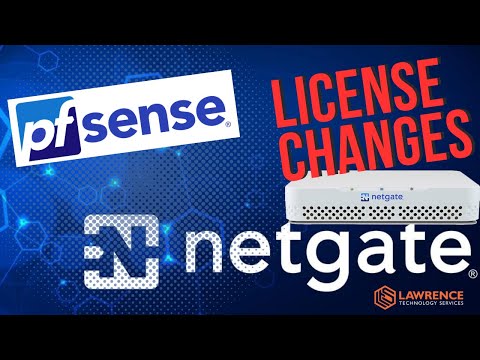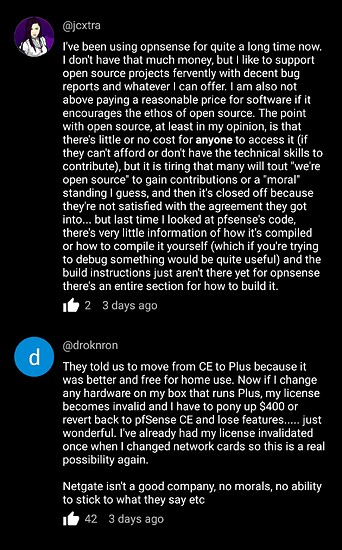Lets start by asking ourselves a simple question. pfSense, who are you? Do you love pfSense? I think I have resolved both of these questions, and the answer is yes.
I’ve used Netgate hardware in production in real life for many purposes. It’s good. TAC, even TAC lite, is a great value add. Plus is worth it for many circumstances.
But I don’t always need or want support. I reserve the right to hack the missing features I may need or want back into the CE codebase. I’ve used, in a pinch, dozens of pfsense firewalls in production. Don’t always have money professionally to do things the “right way”. Pfsense is as close as it gets, and I’m not confident Opnsense can be that stepping stone for me in all circumstances. The other options Tom Lawrence mentioned are just not good options for many use cases. Things like WRT were born out of a pet project of hacking consumer routers. Things like VyOS are great but more complicated than pf.
Thats what this thread is about from my perspective. I’m a professional first and a home user second.
Everything is going cloud first. I’m not on that train. As a community and as individuals we need to stem the tide. There is an erosion of good low-cost on-prem options. This cannot occur. We must hold steadfast against the corporate trend of no one owning anything. If anything, I think now is time to hedge our bets.
Enterprise products exist because people have more money than time. Open source products exist because people have more time than money. Each have their purpose, and pfSense lives in both camps. My only purpose is to ensure that it always does. Sacrifice is sometimes necessary. Freedom may be more valuable than convenience, other times it may be the other way around.
I also live in both camps. I sometimes have more money than sense, and other times have more sense than money. My only purpose is to ensure that it always remains viable in both. I think I can help, if my help is needed. Lets holdfast for now, and watch. Join me if you care.
Agree or disagree, I’d love to hear the thoughts of others here at L1. I have a unique respect for this community. If you all thing I should sit down and shut up, I will respect that.
I’d be interested in knowing if you all here would be if you would be interested in sponsoring, promoting, or somehow supporting a community fork of pfsense. I’m not sure now is the time for a fork, but I am actually spending significant brain cycles trying to fix my problem with Netgate, if one exists. This is not a call to action, but rather, I am seeking individuals of like mind.
I am a hacker. I use that term as a millennial who has probably bastardized Stallman’s meaning of the word. But that’s who I am. Netgate has the right to make money. We have the right to enforce change if Netgate doesn’t kick stuff back to the community. (648) Free software, free society: Richard Stallman at TEDxGeneva 2014 - YouTube
Is it happening? : PFSENSE (reddit.com)
pfSense Licensing changes - Networking & Firewalls - Lawrence Systems Forums
Petition · A Community pfSense Fork · Change.org
(2) Let’s all Pause for a moment and Consider the state of pfsense | ServeTheHome Forums


